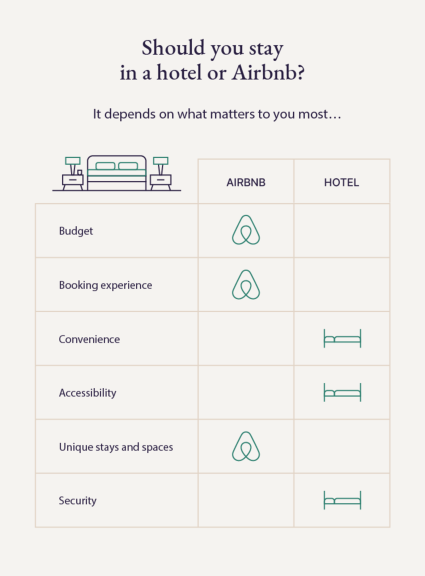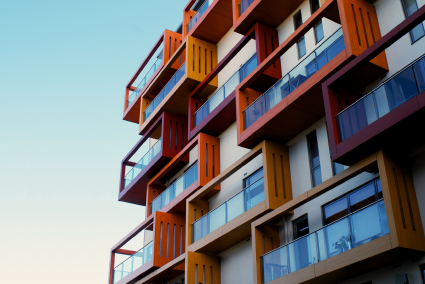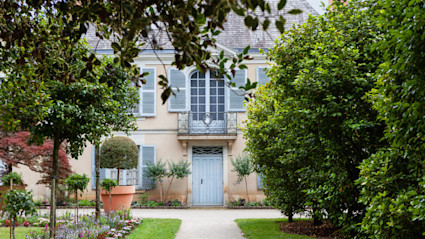Overview: Airbnb vs. hotel
Airbnb is usually cheaper, though its listings have variable quality, privacy and amenities depending on the location and host, which may make people look for Airbnb alternatives. Hotels are typically more expensive but offer more consistent experiences for guests and higher-quality amenities.| Airbnb | Hotel | |
|---|---|---|
| Price | Small Airbnb: median $125 per personLarge Airbnb: median $60 per person | Median $89 per person |
| Accommodation types | Shared rooms, private rooms and entire homes | Mainly private rooms |
| Safety | Safety precautions vary | Security cameras and key card access are the norm |
| Booking experience | Book within a single app | Book on the hotel’s website, by phone or on a third-party platform |
| Locations | Available in urban areas and rural neighborhoods | Typically in urban areas and near airports |
| Privacy | Hosts may live on the property or nearby | Little to no privacy outside of your room |
| Amenities | Varies by listing | Concierge and housekeeping on-site (typically) |
| Length of stay | Long-term travel discounts available | Best suited for stays under a week |
| Accessibility features | Accessibility filters are available when browsing | Hotels must be ADA compliant (generally) |
| Cancellation policies | Fees and policies vary, but are often flexible | Policies and fees vary |
| Checkout | Hosts provide checkout instructions | Hotels may require you to return key cards |
Airbnb: Pros and cons
Airbnb is an app and online platform where you can rent rooms or whole properties to stay. The company facilitates shared and private short-term rentals, connecting travelers with hosts who offer accommodations in their homes or properties. Airbnb has helped guests find accommodations in popular tourist destinations and remote environments since 2008. Airbnbs are typically quick and easy to book, cancel and check into, making them a top contender in the short-term travel market. However, safety and quality can be tough to determine from Airbnb listings.| Pros | Cons |
|---|---|
| Airbnbs are generally cheaper than hotel rooms (based on nightly rates), especially for longer stays | The quality of each listing can be inconsistent |
| Guests can experience living like a local and sometimes have the option of getting to know the host | Little to no guest services available |
| Guests can book entire homes, complete with a kitchen and other living spaces | Safety features can be difficult to gauge |
Hotels: Pros and cons
A hotel is a private business that offers travelers accommodations, access to shared facilities and guest services. In general, hotels offer a consistent quality across locations, so many travelers know what to expect during their stay. However, they are pricier and lack the local, homier feel of an Airbnb.| Pros | Cons |
|---|---|
| Hotels offer convenient services like housekeeping and room service | Hotels are often more expensive than Airbnbs (based on nightly rates only) |
| Surveillance cameras and key card access are common safety features | Most hotel rooms do not include a cooking space |
| Some hotels offer loyalty programs that can generate discounts | Hotel rooms typically lack a personal touch |

9 differences between hotels and Airbnbs
Hotels and Airbnbs differ in price, types of room accommodations, safety resources, locations, privacy, amenity offerings, available lengths of stay, and accessibility.1. Price
When it comes to Airbnb vs. hotel prices, Airbnb has a broad spectrum of accommodation options at different price points, while hotels are often more expensive per night. AirbnbGlobally, the average cost of an Airbnb is $137 per night, though this price can vary significantly depending on factors like location, property type, size and amenities. Cleaning fees can also significantly add to the cost of a stay. Airbnb provides a variety of accommodation options, from budget-friendly to luxurious. Here is a breakdown of what’s included in the price:- Room rate: the cost to book the room or home
- Cleaning fee: the cost of cleaning the space before and after your arrival
- Service fee: the cost for the host to use the Airbnb platform
- Taxes: any local and tourist taxes associated with the listing
- Room rate: the cost to book the room
- Meals: complimentary meals, like breakfast, are factored into the price of your stay
- Resort fees: the cost to keep the resort and its amenities properly maintained
- Taxes: any local and tourist taxes associated with the area
2. Accommodation types
Hotels specialize in providing private rooms, while Airbnb offers multiple accommodation types, including shared and private rooms and entire homes, to suit your budget.AirbnbHosts can categorize their listing based on the layout of their lodging:- Shared room: Similar to a hostel, guests share a room and bathroom with the host or one or multiple strangers.
- Private room: Similar to a hotel setting, guests have a private sleeping area, though they may still have to share a bathroom.
- Entire home: Guests have exclusive use of sleeping areas, bathroom, living space and kitchen.
- Single, double, or twin rooms
- Connecting rooms
- Suites (junior, presidential, penthouse, honeymoon, bridal)
- Villas
- Cabanas
- Bungalows
3. Safety
Regarding safety, hotels may have more resources to keep guests secure than Airbnb. However, even the largest hotel chains are not immune to security breaches. Both Airbnb and hotels can be subject to data breaches since travelers have to share personal information when booking online.Airbnb Since Airbnb listings are managed by individual hosts, it can be difficult to accurately gauge the safety of a location. A Plos One study shows that an increase in short-term rental solutions like Airbnb may lead to an increase in violent crimes within that neighborhood. Here are the safety features that Airbnb provides to combat this:- 24/7 safety line: Although there is no in-person Airbnb staff available, there is a call center available at all times.
- Host background checks: Every Airbnb host must pass a background check.
- Fire prevention: Airbnb encourages every host to install multiple alarms and provide an extinguisher in every listing.
- Security staff: Some hotels have security personnel on site.
- Safety box: Many hotel rooms come with lockable safety boxes.
- Fire prevention: Along with fire and carbon monoxide alarms, hotels generally equip each room with a fire extinguisher and sprinkler system.
- Security cameras: Many hotels install security cameras in common areas.
- Key card access: Many hotels have a key card system that only allows verified guests to access private rooms and shared hotel amenities.
4. Locations
If you’re looking for an off-the-beaten-path lodging option, Airbnb may have what you’re looking for. If a room in the city is what you need, consider staying at a hotel. Airbnb One of the most attractive qualities of Airbnb and other vacation rental services like Sonder is that you can find unique accommodation options across the globe. From a snow igloo in Finland to an underground bunker in New Mexico, Airbnb listings are sure to impress the most seasoned travelers. Airbnb has listings in over 220 countries and regions, including rural and urban settings.HotelsSimilar to Airbnb, Booking.com currently features 228 countries and regions with hotel listings. Hotels are generally found near popular attractions and dining options in dense urban areas. Since hotels require operating staff to cater to guests, running this business model in remote locations can be difficult.5. Privacy
Hotel rooms are generally more private than Airbnbs. Both hotels and Airbnb have privacy concerns; however, many Airbnbs allow self check-in procedures that limit or remove face time with hosts. Airbnb Much like safety, privacy can be difficult to gauge from Airbnb listings. Even if you book an entire home, you could still share a wall or outdoor space with your host, who might invade your privacy. While some hosts may live on the property, others live nearby or may manage their property remotely. The key to finding a private unit is to read the property description and reviews thoroughly. HotelsIn terms of your room, it’s hard to find a more private option than a hotel. However, once you leave that space, you may find yourself swimming in a sea of people in the common areas. Even the most luxurious hotels typically have a check-in procedure requiring guests to interact publicly before retiring to their private rooms.6. Amenities
Hotels often provide guests with a few basics, while some offer more luxurious amenities like gyms and spas. Airbnb amenities can vary widely, from bare bones single rooms to coveted hot tubs and fireplaces. The two can be comparable in their offerings, depending on what you buy. Airbnb Airbnb amenities can vary from listing to listing. Don’t expect the same amenities as you would receive during a hotel stay. Available amenities depend on individual hosts, and quality can differ per listing. Here are some of the top Airbnb amenities hosts should include:- Free parking: Either covered, driveway or street parking may be available.
- Wi-Fi: It will be mentioned in the listing, but it is typically available.
- Air conditioning: Either built-in or portable units may be available.
- Pets allowed: Guests can choose to view only pet-friendly listings.
- Kitchens: Not only do kitchens help cut the cost of dining out, but they also extend the available living space.
- Swimming pool: Either indoor or outdoor pools and a hot tub may be available.
- Room service: Order food straight to your room for an added fee.
- Spa: Book spa packages online or at the front desk for an added fee.
- Housekeeping: Request fresh towels and allow the professionals to clean up when you’re not in the room.
- Concierge: Someone is available to answer questions in person.
7. Length of stay
Hotels are ideal for a weekend getaway. But if you’re searching for a place to stay longer than a few nights, Airbnb is a better option. Airbnb Booking an entire home on Airbnb may be more comfortable than hotels for long-term travel. Airbnb also offers weekly and monthly discounts to travelers wishing to book a longer stay. However, the host determines the discount percentage and it will vary for every listing.HotelsMost hotels cater to short-term travelers who prioritize convenience and location over long-term travel amenities like a kitchen or laundry facilities. Extended-stay hotels cater to long-term travelers, but it isn’t available at every destination.8. Accessibility features
Both Airbnb and hotels try to create more accessible spaces for their guests; however, hotels are often more accessible because they are commercial businesses.Airbnb While Airbnb does have an “Accessibility features” section in their search filters, hosts are not required to comply with Americans with Disabilities Act (ADA) guidelines. Here are the accessibility features you can include in your search:- Step-free entrance: ensures wheelchair users can easily enter
- Toilet grab bar: allows guests to safely sit down and get back up
- Entrances wider than 32 inches: ensures wheelchair users can comfortably go from one room to the next
- Ramps: if stairs are present, a ramp ensures everyone can easily access the entrance, including wheelchair users and strollers
- Elevators: ensures that guests do not have to climb multiple flights of stairs
- Handicap parking: makes it easier for guests with mobility challenges to enter and exit the facility
9. Checkout
Some guests may prefer to stay at hotels to avoid the long list of checkout procedures some Airbnb hosts require. The Airbnb host is responsible for providing a detailed checkout process, while at hotels, checkout tasks are usually simpler.Airbnb The Airbnb checkout experience can be as simple as locking the door when you leave or something similar to what most people expect from a paid housekeeper. Here is what a lengthy checkout procedure could look like for an Airbnb stay:- Take out the trash.
- Strip the bed.
- Put linens in the washer.
- Turn off all lights.
- Wash the dishes.
- Clean common areas.
- Lock the doors and gates.

Consider co-owning a second home instead
Whether you want a romantic weekend getaway or a few weeks of tranquility at your favorite destination, nothing beats the cozy atmosphere of an actual home. Here are the benefits of buying a second home over renting short-term accommodations:- Co-own your second home to ensure a consistent quality experience.
- Easily schedule time in your home.
- Invest in a real estate asset and potentially benefit from equity.
- Enjoy a fully managed vacation home with a professional property manager.
- Relax in your home away from home.
Co-own a vacation destination today
Weighing Airbnbs vs. hotels may help you plan the ideal short-term vacation, but what if your dream vacation spot is a repeat destination? Co-owning a second home makes repeat vacations cost-effective and stress-free. As a co-owner of a Pacaso, you can skip the headache of property management and schedule a relaxing stay at your own second home with our convenient SmartStay system. Already have a vacation destination in mind? Pacaso homes are available in a variety of world-class locations.Luxury co-owned vacation homes
See allAirbnb vs. hotel FAQ
01: Why are hotel rooms on Airbnb?
Individuals and entities can list their accommodations on Airbnb. As long as the hotel pays the Airbnb service fee, they can benefit from the large pool of Airbnb users.
02: What is an Airbnb hotel?
An Airbnb hotel is a blend of the Airbnb booking model and traditional hotel accommodations.
03: Are hotels losing business to Airbnb?
Yes. One report found that around $450 million in hotel revenue is lost each year due to Airbnb's growth.















